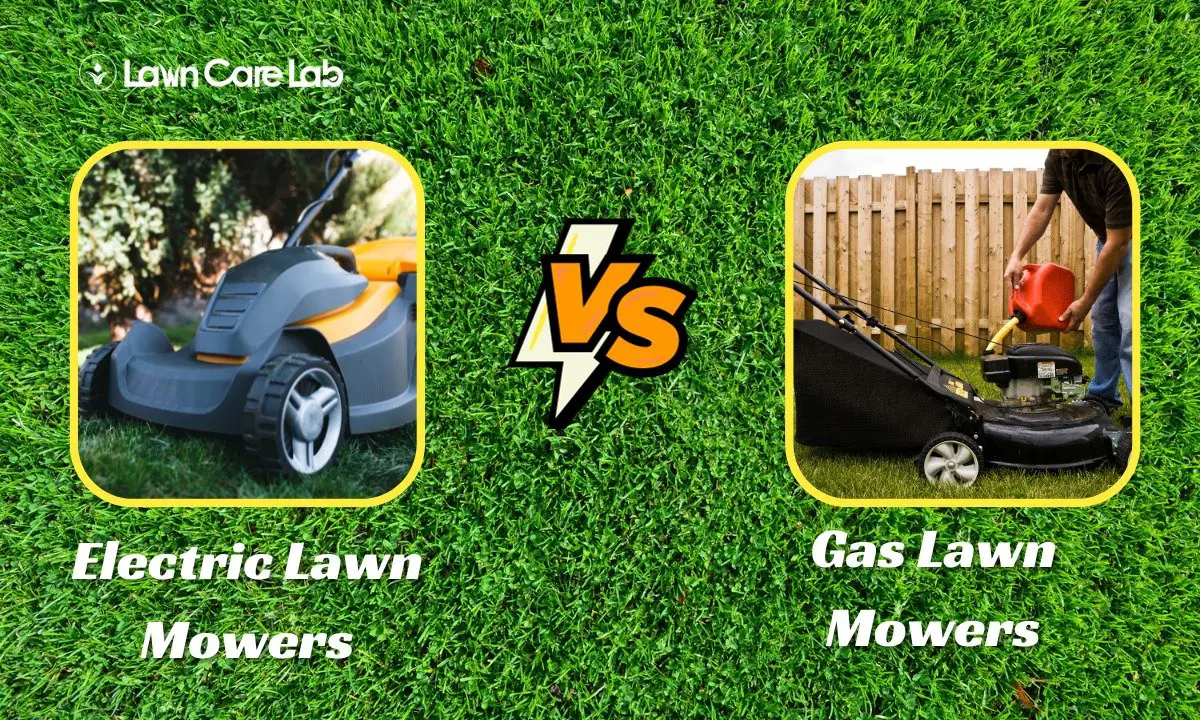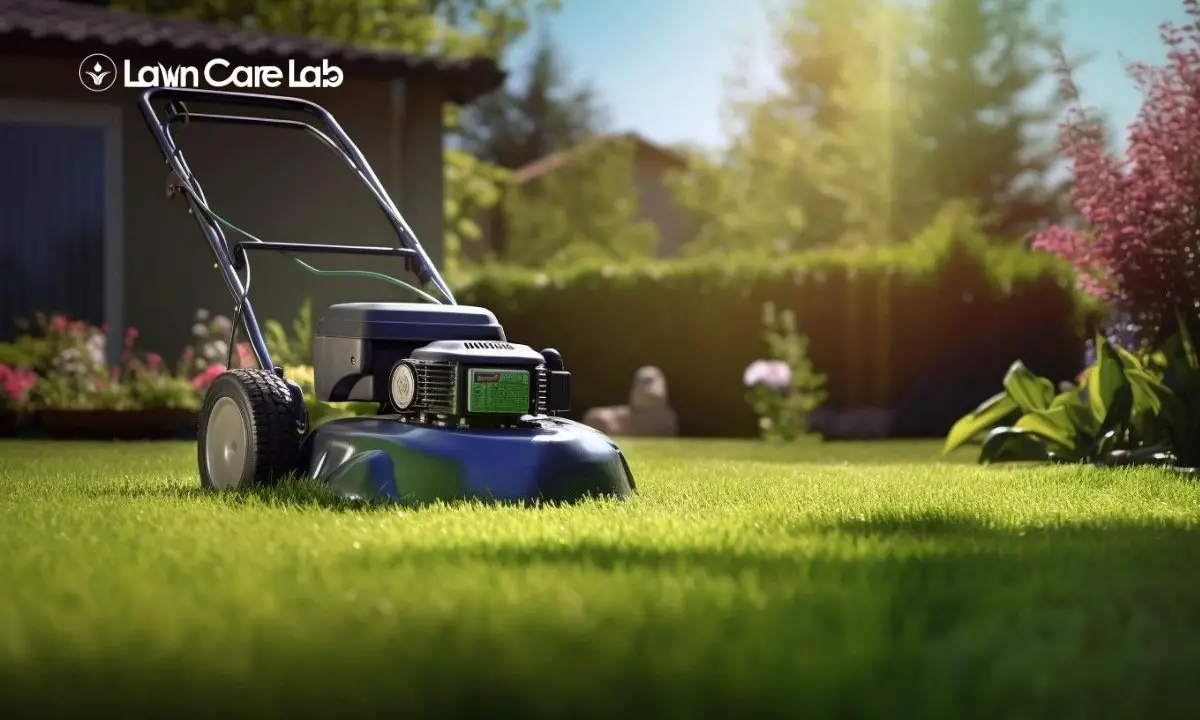You stand on the cusp of investing in a new lawn mower, yet you find yourself wavering between electric and gas variants. Fear not; we’re here to illuminate your path.
This guide will methodically examine the advantages and disadvantages of each model, considering performance, safety, and environmental ramifications.
By the conclusion, you’ll possess the knowledge necessary to discern what’s optimal for your lawn and personal requirements.
Let’s commence this investigative journey to your perfect lawn care solution.
Table of Contents
Understanding the Basics of Lawn Mowers

Understanding basic distinctions is vital before you settle on a particular lawn mower.
Electric mowers, celebrated for their silent operation and scant upkeep, can be either cord-fed or battery-operated.
Conversely, gas-powered mowers, although demanding frequent refueling and heightened maintenance, are often characterized by superior power.
What is an Electric Lawn Mower?
Should you consider a new lawn mower, an electric variant might be advantageous, providing a more tranquil, lightweight, and effortless maintenance option than conventional gas mowers. Electric mowers are divided into two categories: corded and cordless.
Electric models need an outlet, limiting mobility but providing constant power, while cordless models offer more movement flexibility with a finite operational time. Both types are safer and more eco-friendly as they eliminate the need to handle gas and don’t produce harmful emissions.
Having elucidated the concept of electric mowers, we shall now proceed to discuss gas lawnmowers.
What is a Gas Lawn Mower?
Gas lawn mowers are powerful and reliable but require more maintenance due to their gasoline-powered engines.
Here are some fundamental insights into gas mowers:
- They’re typically more cacophonous and weighty than their electric equivalents.
- Care routines consist of routine oil substitutions and blade honing.
- They’re available in both manual push and self-propelled variants.
To pick the right gas mower, consider your lawn’s size and your physical capacity. Always follow the manufacturer’s instructions for safe operation to prevent harm.
Diving into the World of Electric Lawn Mowers

Intrigued by electric lawnmowers? We’ll provide impartial insights to help you decide if it’s the right tool for your lawn care needs.
Benefits of Electric Lawn Mowers
Electric lawn mowers emerge as an efficacious and environmentally conscious choice for maintaining your verdant spaces.
Their straightforward operational design, characterized by a single-button start and minimal maintenance, embodies user-friendliness.
Notably, their absence of detrimental emissions elevates them as an eco-friendly solution for your landscaping endeavors.
Environmental Impact
Assessing your lawn care approach necessitates understanding the substantial environmental benefits electric mowers provide. Their operation is devoid of harmful emissions and significantly reduces noise pollution.
- Absence of detrimental emissions
- Diminished noise pollution
- Environmentally considerate option
These attributes establish electric mowers as a secure and sustainable solution for your lawn care requirements.
Maintenance and Operation
Preserving and operating an electric lawn mower proves to be decidedly less complicated than its gasoline-powered equivalent. These machines necessitate nominal maintenance, thereby conserving your valuable time and resources.
Featuring a lighter construction, they require less physical effort to manipulate. Safety is elevated due to the absence of combustible fuels, mitigating fire hazards.
Undeniably, the advantages of electric lawn mowers extend far beyond their mere ecological impact.
Potential Drawbacks of Electric Lawn Mowers
The serene operation and eco-friendly nature of electric lawn mowers may indeed be appealing. Yet, it’s vital to weigh some potential disadvantages.
Power limitations could curtail their efficacy on expansive lawns. Battery longevity or cord extension may impinge on maneuverability.
We shall elucidate these drawbacks to facilitate a well-informed decision on your part.
Power Limitations
While electric lawn mowers may appeal due to their convenience and environmental friendliness, they typically don’t match the robust power of their gas-fueled counterparts. This shortfall may surface as a struggle when confronting tall or dense grass.
The raw vigor necessary for heavy-duty tasks could be wanting.
Tackling overgrown lawns might prove to be a Herculean task for them.
Achieving a pristine cut with electric models could demand a longer time investment.
Bear these factors in mind for an effective and secure lawn maintenance endeavor.
Battery Life and Cord Restrictions
Addressing the potential pitfalls of electric lawn mowers, it’s often observed that battery longevity and cord length constraints can introduce significant complications to your lawn maintenance strategy.
Cordless variants might exhaust their power supply before the completion of the task. In contrast, the operational range of corded versions is dictated by the length of the power cord, possibly leaving sections of expansive lawns unattended.
Prior to settling on an electric mower, it’s imperative to analyze the dimensions and configuration of your lawn meticulously.
Exploring the Realm of Gas Lawn Mowers

Let’s shift our focus to the domain of gas lawn mowers. These appliances present substantial benefits, albeit accompanied by certain challenges.
Our comprehensive discourse on the subject aims to equip you with the necessary insights to make a well-informed choice.
Advantages of Gas Lawn Mowers
You might be pondering, ‘What sets gas lawn mowers apart?’
Foremost, they’re renowned for their robust power and efficacy, adept at maintaining expansive lawns without breaking a sweat.
Furthermore, they aren’t constrained by run-time limitations, ensuring uninterrupted operation provided that fuel is available.
Power and Efficiency
Within the sphere of potency and productivity, the functionality of a gas lawn mower stands unparalleled.
- These machines effortlessly conquer tall, dense grass, simplifying your task.
- Gas mowers’ durability and steadfast performance have made them appealing for many years.
- They ensure a consistent power output, facilitating the upkeep of your lawn to a commendable standard on each occasion.
Opt judiciously for a smooth, efficient lawn care experience.
No Run-Time Limitation
Gas lawn mowers can run non-stop as long as they’re fueled, which makes them ideal for large lawns. No need to worry about battery depletion, ensuring uninterrupted mowing.
However, like many things, this type of mower carries its own set of drawbacks, which we’ll discuss in the following section, ‘drawbacks of gas lawn mowers’.
Disadvantages of Gas Lawn Mowers
While the robust performance of gas lawn mowers may allure you, balancing this with the notable downsides is crucial.
Their environmental impact is far from negligible, leading to a less eco-friendly choice.
Furthermore, these machines demand considerable upkeep and pose as a louder alternative compared to their electric counterparts.
Environmental Considerations
Gasoline-powered lawn mowers contribute significantly to air pollution, worsen our carbon footprint, and accelerate global warming.
Cognizance of these environmental implications could steer you towards more sustainable, ecologically benign alternatives. It’s crucial to remember that the pursuit of effective lawn care strategies need not jeopardize the well-being of our planet.
Maintenance and Noise Levels
Understanding the potential disadvantages of gas lawn mowers includes routine maintenance and noise levels, such as regular oil changes and spark plug replacements.
Moreover, the persistent clamor could lead to considerable disruption, potentially inducing discomfort or even long-term auditory impairment. These aspects could substantially shape your overall experience and safety in lawn care.
Making Your Decision: Electric vs. Gas Lawn Mowers
In the final analysis, the selection of an electric or gas-powered lawn mower is a subjective one.
It’s paramount to judiciously evaluate each variant’s advantages and disadvantages, considering factors like upkeep necessities, acoustical disturbance, and ecological implications.
Upon thoroughly inspecting these elements, you’ll find yourself in a more favorable position to discern the lawn maintenance method that optimally aligns with your preferences.
Consideration Factors
In the process of distinguishing between electric and gas-powered lawnmowers, several paramount elements warrant careful contemplation.
Initially, assess the dimensions and topography of your lawn, as these factors significantly dictate the most suitable mower for your needs.
Environmental implications and the fiscal and temporal commitments associated with upkeep shouldn’t be discounted in your decision-making process.
Size and Terrain of Your Lawn
When it comes to the pivotal decision of selecting either an electric or gas lawnmower, a few key factors must be taken into account – the size and topography of your lawn.
- Expansive, irregular terrains might necessitate the robust capabilities of a gas mower.
- Conversely, compact and level lawns can be deftly managed with the streamlined efficiency of an electric mower.
The criticality of safety can’t be overstated. Therefore, opting for a mower that can be manipulated easily and safely, aligning with your lawn’s unique conditions is essential.
Environmental Concerns
Given the unique requirements of your lawn, it’s crucial to evaluate the environmental impact of your decision between electric and gas mowers.
Electric mowers undoubtedly hold the high ground for those vigilant about the environment, emitting no detrimental pollutants.
This is a pivotal point to weigh, particularly for those steadfast in their commitment to safeguarding the vitality of our planet.
Budget and Maintenance
When choosing the perfect lawn mower, balancing your financial capabilities with the anticipated maintenance demands of electric and gas models is crucial.
Electric mowers, while carrying a heftier initial price tag, tend to be less demanding in terms of upkeep. Conversely, although potentially more affordable at first glance, gas mowers may necessitate a more rigorous maintenance regimen.
Take into account your financial boundaries and the level of continuous upkeep you’re prepared to commit to.
Handpicking the appropriate mower will pave the way for a safer, more streamlined lawn care experience.
Concluding Thoughts on Lawn Care Essentials
To decide between an electric or gas lawn mower, consider your lawn size, physical ability, and environmental concerns.
Electric mowers, with their ease of operation, quieter operation, and reduced emission, are optimally suited for smaller lawns, albeit at the cost of requiring a power source and possibly compromising on power.
Despite their weight, noise, and emissions, gas mowers are ideal for larger lawns and tough grass. Upfront and upkeep costs vary between the two types.
Prioritize safety, exercise discernment, and ensure the chosen mower aligns seamlessly with your unique requirements, thus transforming lawn care into a smooth and effortless task.
- How Green Spaces Influence Community Interactions - July 8, 2024
- Lawn Fungal Diseases: Identification and Treatment - July 3, 2024
- Lawn Care for All Seasons: A Year-Round Guide for Extreme Climates - June 24, 2024





